HI6005: Evaluating Early Management Theories in Modern Organizations
VerifiedAdded on 2024/05/14
|18
|3531
|335
Report
AI Summary
This report provides an overview of early management theories and their relevance to the modern world, focusing on the contributions of Frederick Taylor, Henri Fayol, and Max Weber. It begins by defining management and its key functions, such as planning, staffing, and leading. The report then delves into Taylor's scientific management principles, emphasizing efficiency and cooperation. It also discusses Fayol's principles of management, including division of work, authority, and unity of command, illustrating their application with examples. Finally, the report examines Weber's bureaucratic theory, highlighting the importance of organizational structure and authority. The analysis demonstrates how these classical theories continue to influence management practices in contemporary organizations. Desklib provides access to this and many other solved assignments for students.
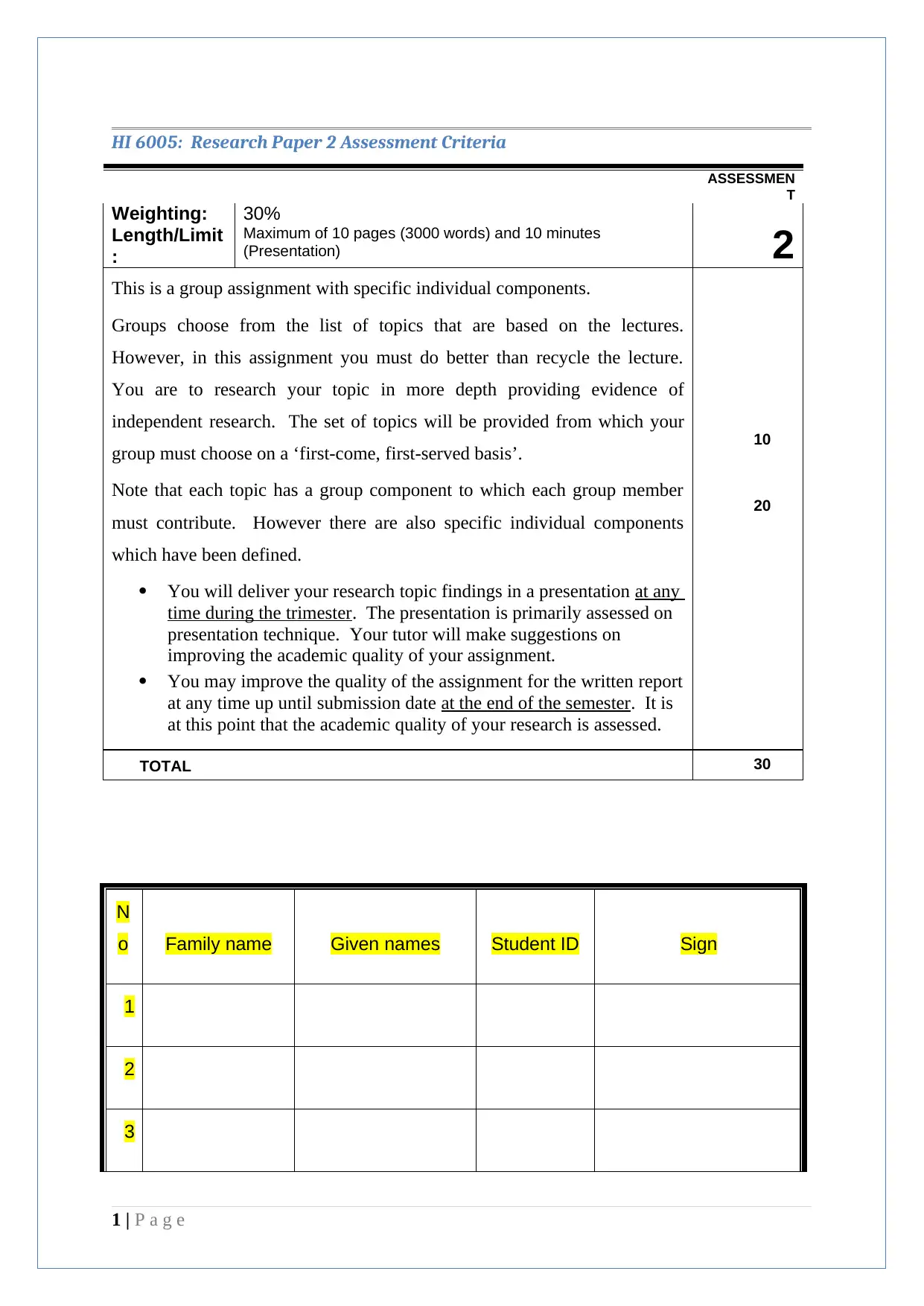
HI 6005: Research Paper 2 Assessment Criteria
ASSESSMEN
T
Weighting:
Length/Limit
:
30%
Maximum of 10 pages (3000 words) and 10 minutes
(Presentation) 2
This is a group assignment with specific individual components.
Groups choose from the list of topics that are based on the lectures.
However, in this assignment you must do better than recycle the lecture.
You are to research your topic in more depth providing evidence of
independent research. The set of topics will be provided from which your
group must choose on a ‘first-come, first-served basis’.
Note that each topic has a group component to which each group member
must contribute. However there are also specific individual components
which have been defined.
You will deliver your research topic findings in a presentation at any
time during the trimester. The presentation is primarily assessed on
presentation technique. Your tutor will make suggestions on
improving the academic quality of your assignment.
You may improve the quality of the assignment for the written report
at any time up until submission date at the end of the semester. It is
at this point that the academic quality of your research is assessed.
10
20
TOTAL 30
N
o Family name Given names Student ID Sign
1
2
3
1 | P a g e
ASSESSMEN
T
Weighting:
Length/Limit
:
30%
Maximum of 10 pages (3000 words) and 10 minutes
(Presentation) 2
This is a group assignment with specific individual components.
Groups choose from the list of topics that are based on the lectures.
However, in this assignment you must do better than recycle the lecture.
You are to research your topic in more depth providing evidence of
independent research. The set of topics will be provided from which your
group must choose on a ‘first-come, first-served basis’.
Note that each topic has a group component to which each group member
must contribute. However there are also specific individual components
which have been defined.
You will deliver your research topic findings in a presentation at any
time during the trimester. The presentation is primarily assessed on
presentation technique. Your tutor will make suggestions on
improving the academic quality of your assignment.
You may improve the quality of the assignment for the written report
at any time up until submission date at the end of the semester. It is
at this point that the academic quality of your research is assessed.
10
20
TOTAL 30
N
o Family name Given names Student ID Sign
1
2
3
1 | P a g e
Paraphrase This Document
Need a fresh take? Get an instant paraphrase of this document with our AI Paraphraser
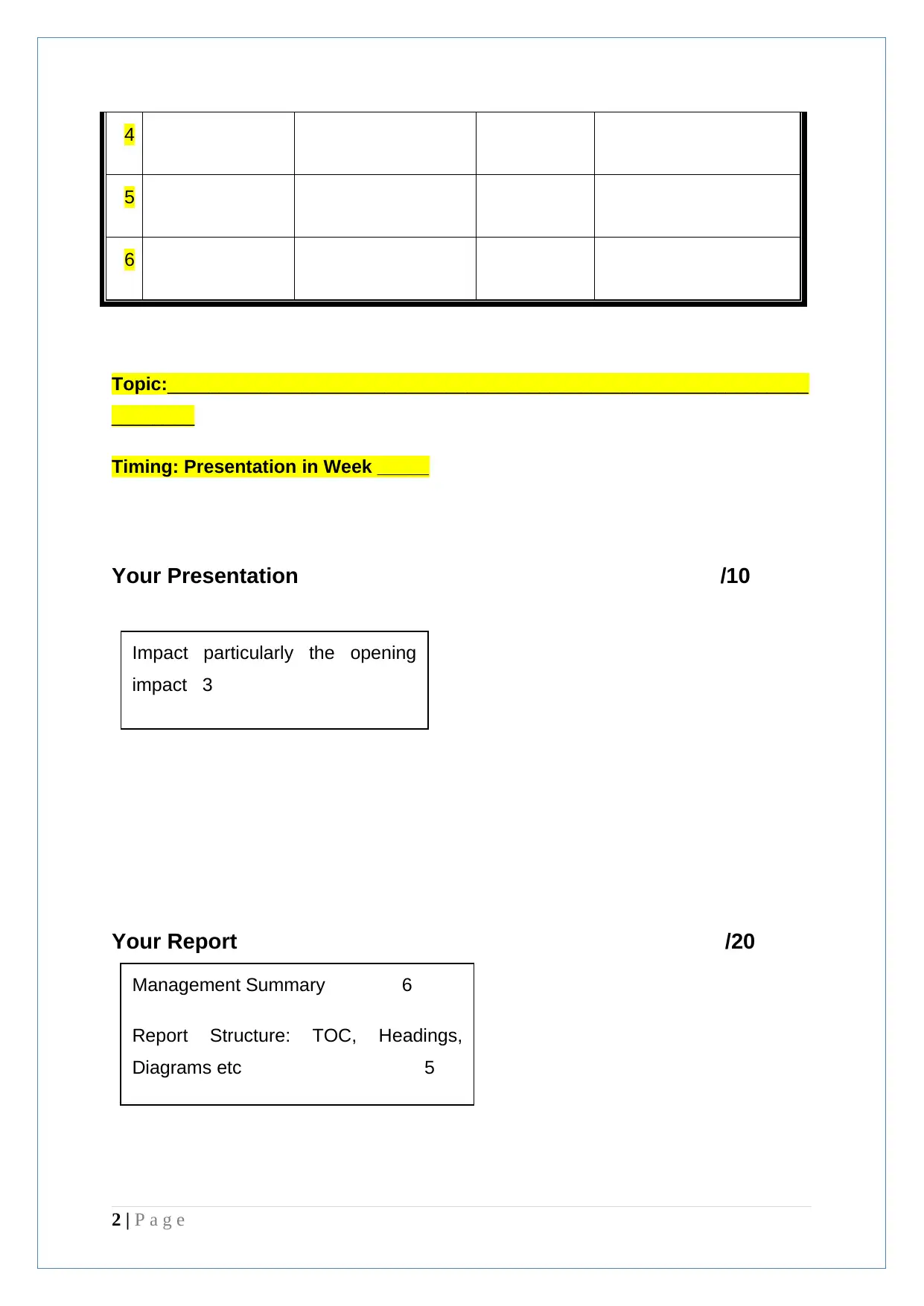
4
5
6
Topic:______________________________________________________________
________
Timing: Presentation in Week _____
Your Presentation /10
Your Report /20
2 | P a g e
Management Summary 6
Report Structure: TOC, Headings,
Diagrams etc 5
Impact particularly the opening
impact 3
5
6
Topic:______________________________________________________________
________
Timing: Presentation in Week _____
Your Presentation /10
Your Report /20
2 | P a g e
Management Summary 6
Report Structure: TOC, Headings,
Diagrams etc 5
Impact particularly the opening
impact 3
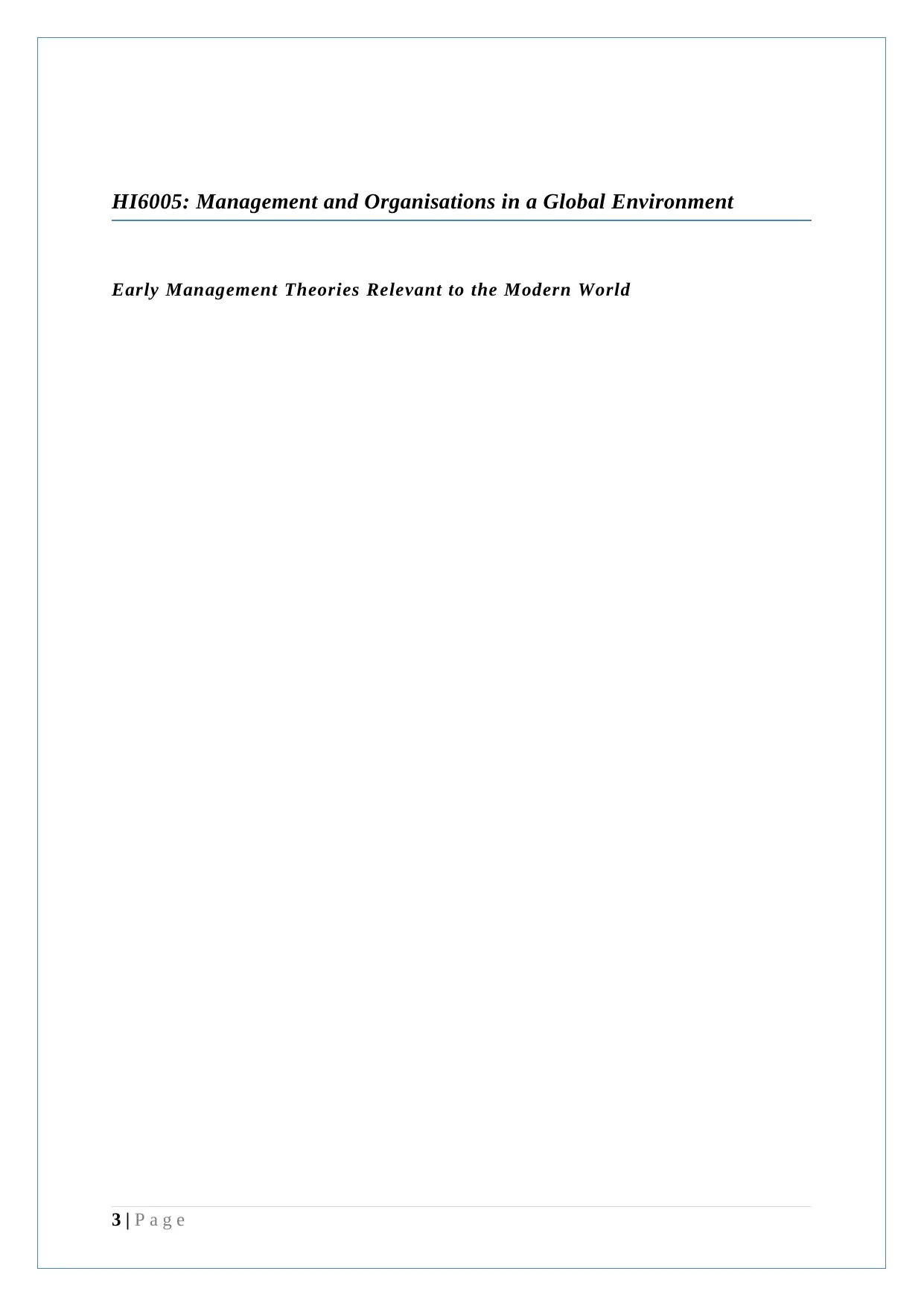
HI6005: Management and Organisations in a Global Environment
Early Management Theories Relevant to the Modern World
3 | P a g e
Early Management Theories Relevant to the Modern World
3 | P a g e
⊘ This is a preview!⊘
Do you want full access?
Subscribe today to unlock all pages.

Trusted by 1+ million students worldwide
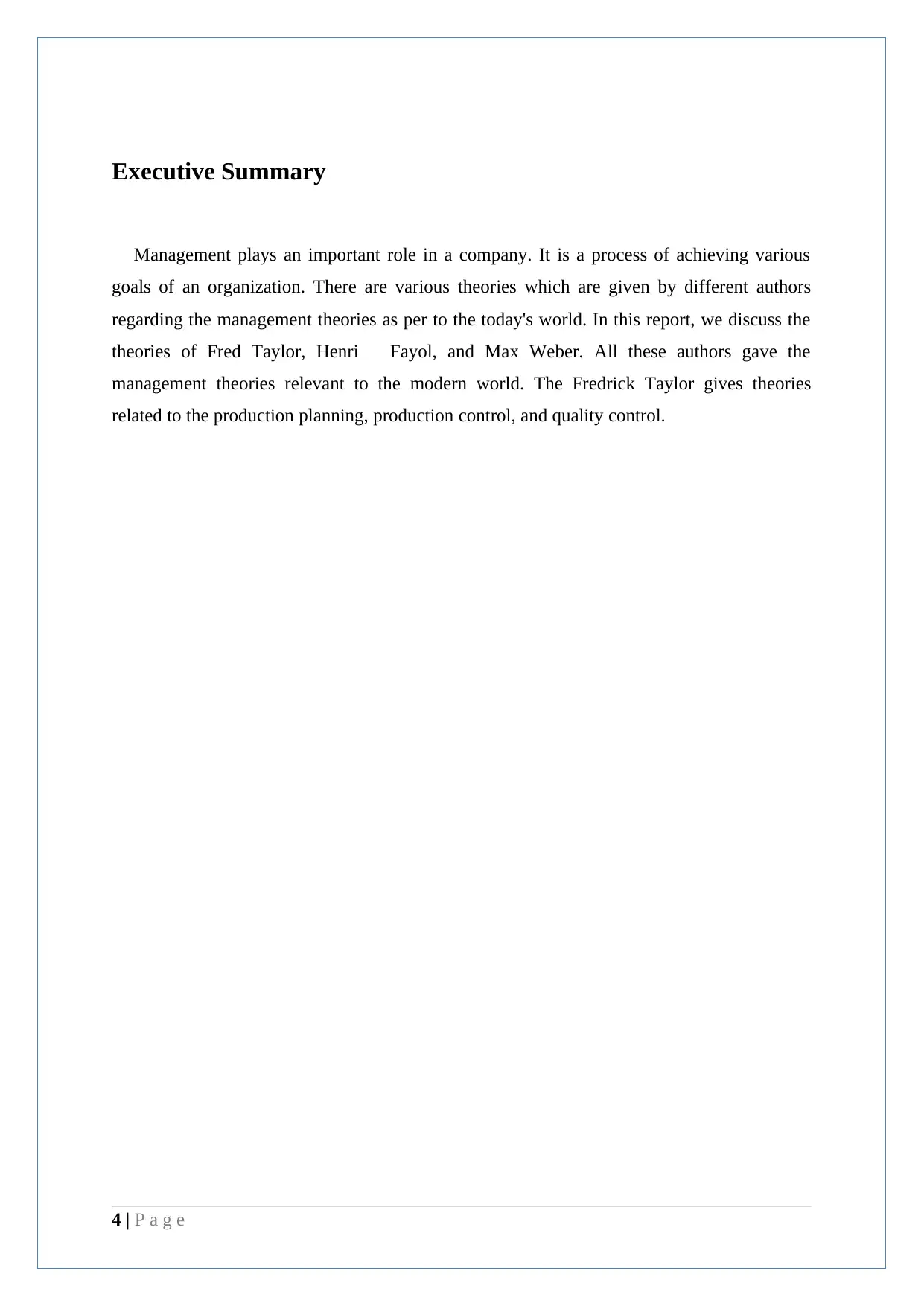
Executive Summary
Management plays an important role in a company. It is a process of achieving various
goals of an organization. There are various theories which are given by different authors
regarding the management theories as per to the today's world. In this report, we discuss the
theories of Fred Taylor, Henri Fayol, and Max Weber. All these authors gave the
management theories relevant to the modern world. The Fredrick Taylor gives theories
related to the production planning, production control, and quality control.
4 | P a g e
Management plays an important role in a company. It is a process of achieving various
goals of an organization. There are various theories which are given by different authors
regarding the management theories as per to the today's world. In this report, we discuss the
theories of Fred Taylor, Henri Fayol, and Max Weber. All these authors gave the
management theories relevant to the modern world. The Fredrick Taylor gives theories
related to the production planning, production control, and quality control.
4 | P a g e
Paraphrase This Document
Need a fresh take? Get an instant paraphrase of this document with our AI Paraphraser
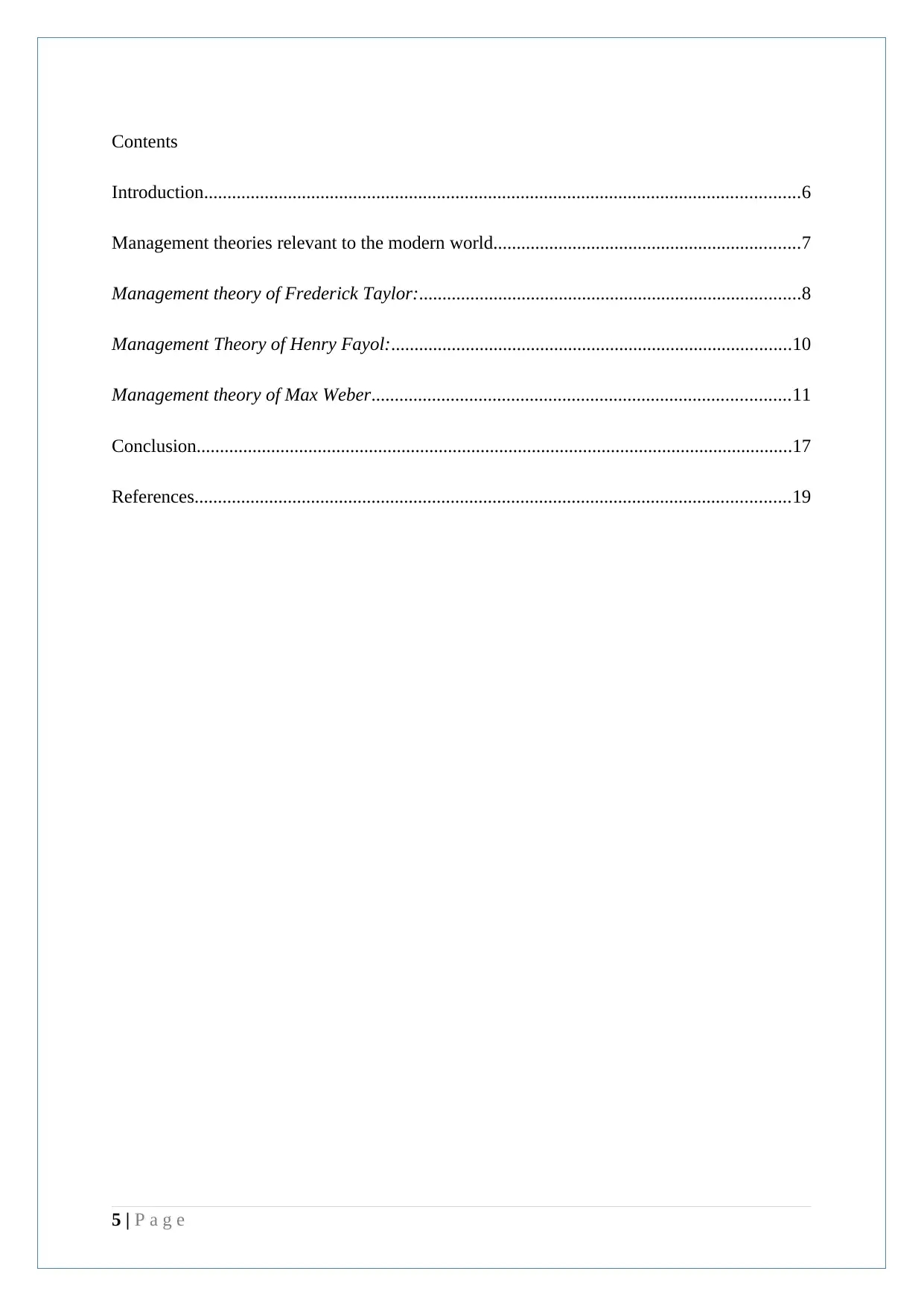
Contents
Introduction................................................................................................................................6
Management theories relevant to the modern world..................................................................7
Management theory of Frederick Taylor:..................................................................................8
Management Theory of Henry Fayol:......................................................................................10
Management theory of Max Weber..........................................................................................11
Conclusion................................................................................................................................17
References................................................................................................................................19
5 | P a g e
Introduction................................................................................................................................6
Management theories relevant to the modern world..................................................................7
Management theory of Frederick Taylor:..................................................................................8
Management Theory of Henry Fayol:......................................................................................10
Management theory of Max Weber..........................................................................................11
Conclusion................................................................................................................................17
References................................................................................................................................19
5 | P a g e
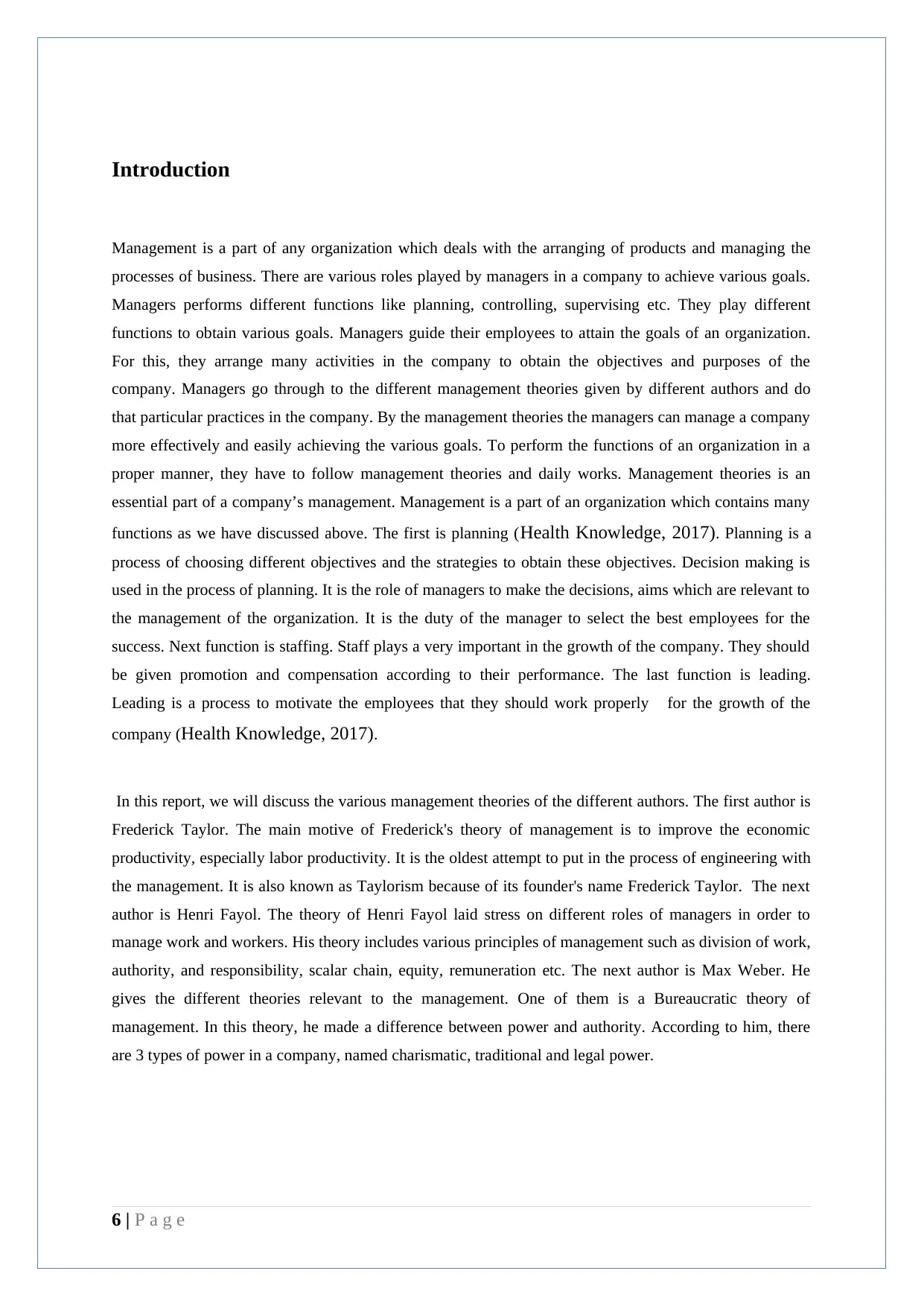
Introduction
Management is a part of any organization which deals with the arranging of products and managing the
processes of business. There are various roles played by managers in a company to achieve various goals.
Managers performs different functions like planning, controlling, supervising etc. They play different
functions to obtain various goals. Managers guide their employees to attain the goals of an organization.
For this, they arrange many activities in the company to obtain the objectives and purposes of the
company. Managers go through to the different management theories given by different authors and do
that particular practices in the company. By the management theories the managers can manage a company
more effectively and easily achieving the various goals. To perform the functions of an organization in a
proper manner, they have to follow management theories and daily works. Management theories is an
essential part of a company’s management. Management is a part of an organization which contains many
functions as we have discussed above. The first is planning (Health Knowledge, 2017). Planning is a
process of choosing different objectives and the strategies to obtain these objectives. Decision making is
used in the process of planning. It is the role of managers to make the decisions, aims which are relevant to
the management of the organization. It is the duty of the manager to select the best employees for the
success. Next function is staffing. Staff plays a very important in the growth of the company. They should
be given promotion and compensation according to their performance. The last function is leading.
Leading is a process to motivate the employees that they should work properly for the growth of the
company (Health Knowledge, 2017).
In this report, we will discuss the various management theories of the different authors. The first author is
Frederick Taylor. The main motive of Frederick's theory of management is to improve the economic
productivity, especially labor productivity. It is the oldest attempt to put in the process of engineering with
the management. It is also known as Taylorism because of its founder's name Frederick Taylor. The next
author is Henri Fayol. The theory of Henri Fayol laid stress on different roles of managers in order to
manage work and workers. His theory includes various principles of management such as division of work,
authority, and responsibility, scalar chain, equity, remuneration etc. The next author is Max Weber. He
gives the different theories relevant to the management. One of them is a Bureaucratic theory of
management. In this theory, he made a difference between power and authority. According to him, there
are 3 types of power in a company, named charismatic, traditional and legal power.
6 | P a g e
Management is a part of any organization which deals with the arranging of products and managing the
processes of business. There are various roles played by managers in a company to achieve various goals.
Managers performs different functions like planning, controlling, supervising etc. They play different
functions to obtain various goals. Managers guide their employees to attain the goals of an organization.
For this, they arrange many activities in the company to obtain the objectives and purposes of the
company. Managers go through to the different management theories given by different authors and do
that particular practices in the company. By the management theories the managers can manage a company
more effectively and easily achieving the various goals. To perform the functions of an organization in a
proper manner, they have to follow management theories and daily works. Management theories is an
essential part of a company’s management. Management is a part of an organization which contains many
functions as we have discussed above. The first is planning (Health Knowledge, 2017). Planning is a
process of choosing different objectives and the strategies to obtain these objectives. Decision making is
used in the process of planning. It is the role of managers to make the decisions, aims which are relevant to
the management of the organization. It is the duty of the manager to select the best employees for the
success. Next function is staffing. Staff plays a very important in the growth of the company. They should
be given promotion and compensation according to their performance. The last function is leading.
Leading is a process to motivate the employees that they should work properly for the growth of the
company (Health Knowledge, 2017).
In this report, we will discuss the various management theories of the different authors. The first author is
Frederick Taylor. The main motive of Frederick's theory of management is to improve the economic
productivity, especially labor productivity. It is the oldest attempt to put in the process of engineering with
the management. It is also known as Taylorism because of its founder's name Frederick Taylor. The next
author is Henri Fayol. The theory of Henri Fayol laid stress on different roles of managers in order to
manage work and workers. His theory includes various principles of management such as division of work,
authority, and responsibility, scalar chain, equity, remuneration etc. The next author is Max Weber. He
gives the different theories relevant to the management. One of them is a Bureaucratic theory of
management. In this theory, he made a difference between power and authority. According to him, there
are 3 types of power in a company, named charismatic, traditional and legal power.
6 | P a g e
⊘ This is a preview!⊘
Do you want full access?
Subscribe today to unlock all pages.

Trusted by 1+ million students worldwide
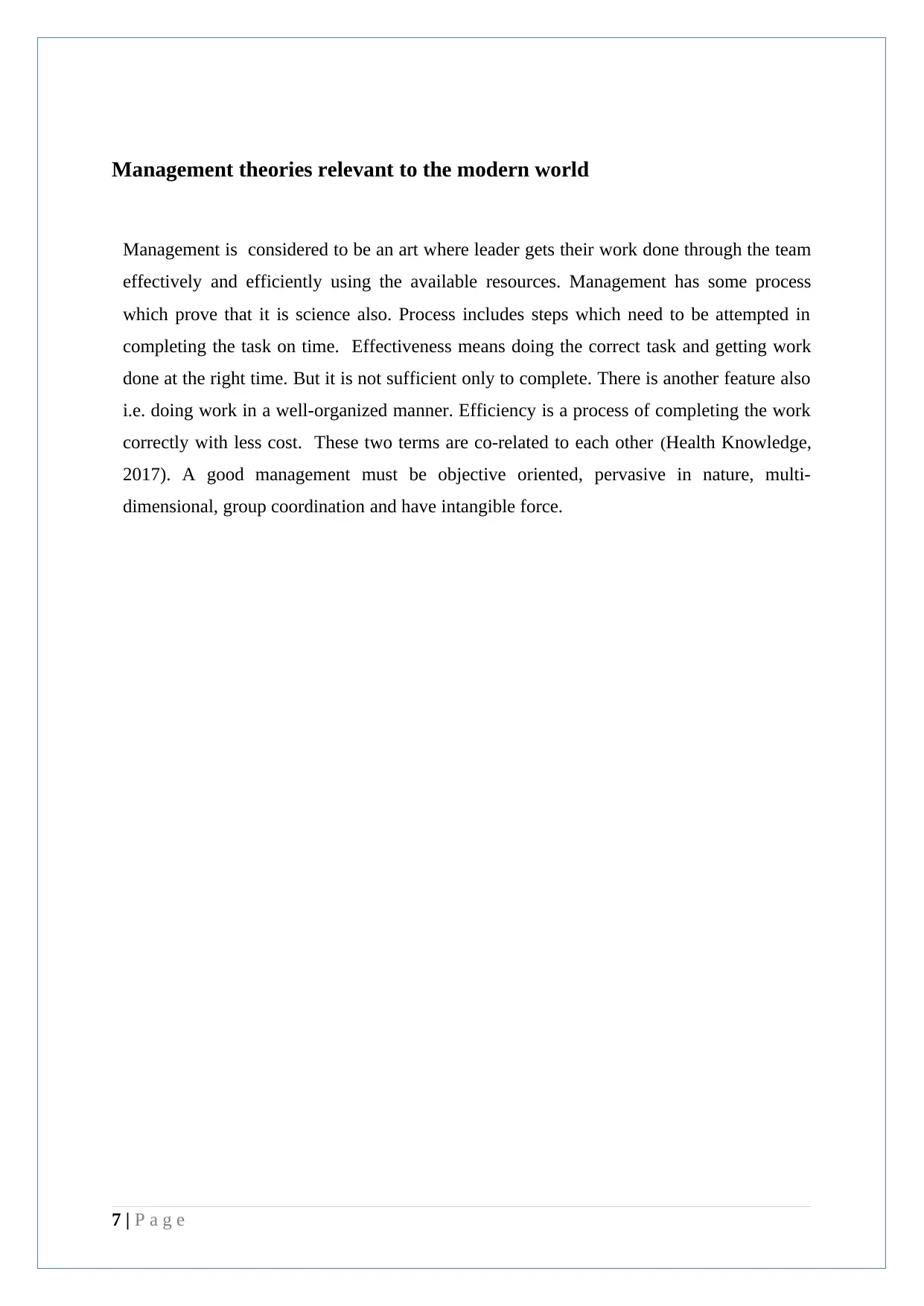
Management theories relevant to the modern world
Management is considered to be an art where leader gets their work done through the team
effectively and efficiently using the available resources. Management has some process
which prove that it is science also. Process includes steps which need to be attempted in
completing the task on time. Effectiveness means doing the correct task and getting work
done at the right time. But it is not sufficient only to complete. There is another feature also
i.e. doing work in a well-organized manner. Efficiency is a process of completing the work
correctly with less cost. These two terms are co-related to each other (Health Knowledge,
2017). A good management must be objective oriented, pervasive in nature, multi-
dimensional, group coordination and have intangible force.
7 | P a g e
Management is considered to be an art where leader gets their work done through the team
effectively and efficiently using the available resources. Management has some process
which prove that it is science also. Process includes steps which need to be attempted in
completing the task on time. Effectiveness means doing the correct task and getting work
done at the right time. But it is not sufficient only to complete. There is another feature also
i.e. doing work in a well-organized manner. Efficiency is a process of completing the work
correctly with less cost. These two terms are co-related to each other (Health Knowledge,
2017). A good management must be objective oriented, pervasive in nature, multi-
dimensional, group coordination and have intangible force.
7 | P a g e
Paraphrase This Document
Need a fresh take? Get an instant paraphrase of this document with our AI Paraphraser
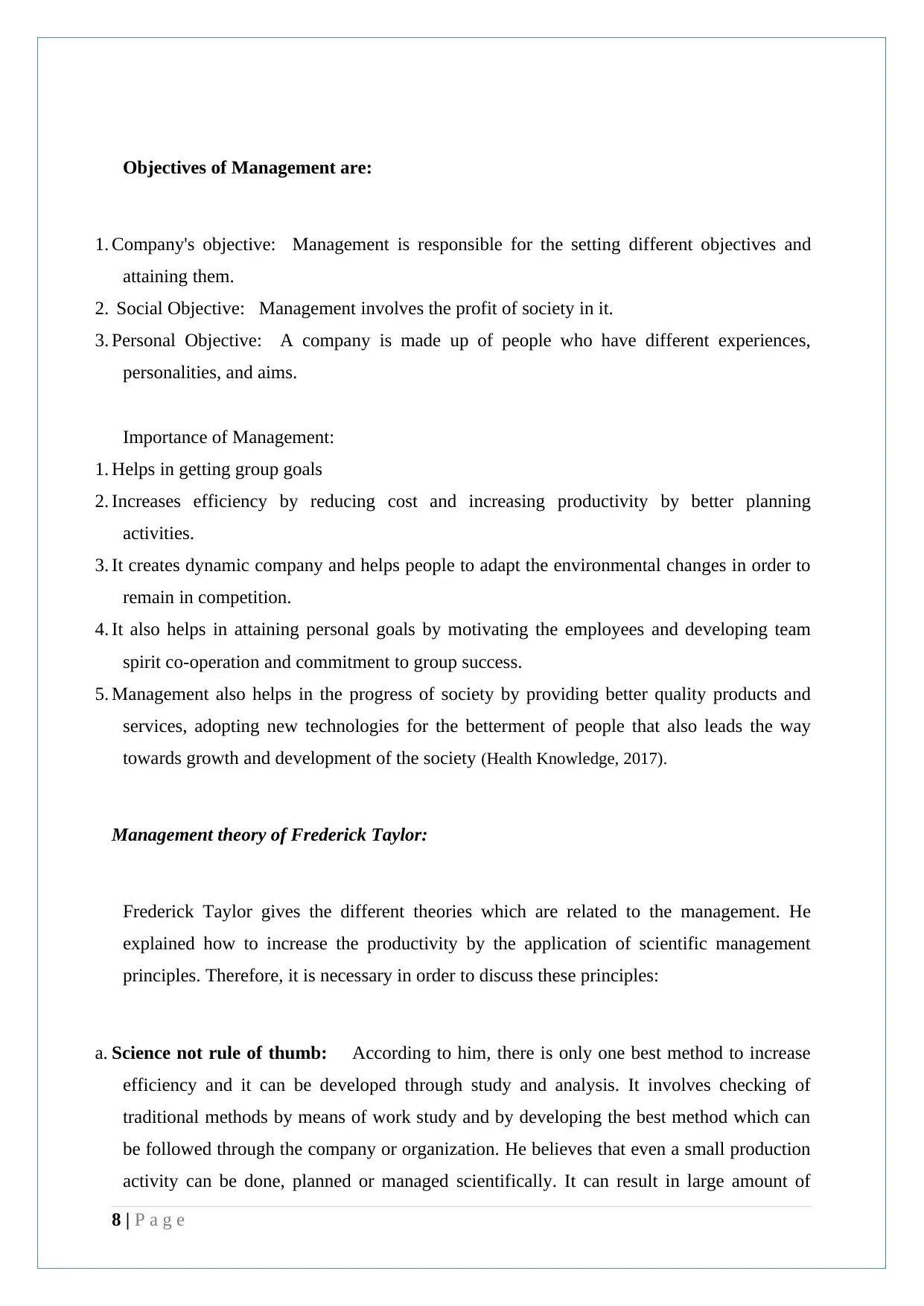
Objectives of Management are:
1. Company's objective: Management is responsible for the setting different objectives and
attaining them.
2. Social Objective: Management involves the profit of society in it.
3. Personal Objective: A company is made up of people who have different experiences,
personalities, and aims.
Importance of Management:
1. Helps in getting group goals
2. Increases efficiency by reducing cost and increasing productivity by better planning
activities.
3. It creates dynamic company and helps people to adapt the environmental changes in order to
remain in competition.
4. It also helps in attaining personal goals by motivating the employees and developing team
spirit co-operation and commitment to group success.
5. Management also helps in the progress of society by providing better quality products and
services, adopting new technologies for the betterment of people that also leads the way
towards growth and development of the society (Health Knowledge, 2017).
Management theory of Frederick Taylor:
Frederick Taylor gives the different theories which are related to the management. He
explained how to increase the productivity by the application of scientific management
principles. Therefore, it is necessary in order to discuss these principles:
a. Science not rule of thumb: According to him, there is only one best method to increase
efficiency and it can be developed through study and analysis. It involves checking of
traditional methods by means of work study and by developing the best method which can
be followed through the company or organization. He believes that even a small production
activity can be done, planned or managed scientifically. It can result in large amount of
8 | P a g e
1. Company's objective: Management is responsible for the setting different objectives and
attaining them.
2. Social Objective: Management involves the profit of society in it.
3. Personal Objective: A company is made up of people who have different experiences,
personalities, and aims.
Importance of Management:
1. Helps in getting group goals
2. Increases efficiency by reducing cost and increasing productivity by better planning
activities.
3. It creates dynamic company and helps people to adapt the environmental changes in order to
remain in competition.
4. It also helps in attaining personal goals by motivating the employees and developing team
spirit co-operation and commitment to group success.
5. Management also helps in the progress of society by providing better quality products and
services, adopting new technologies for the betterment of people that also leads the way
towards growth and development of the society (Health Knowledge, 2017).
Management theory of Frederick Taylor:
Frederick Taylor gives the different theories which are related to the management. He
explained how to increase the productivity by the application of scientific management
principles. Therefore, it is necessary in order to discuss these principles:
a. Science not rule of thumb: According to him, there is only one best method to increase
efficiency and it can be developed through study and analysis. It involves checking of
traditional methods by means of work study and by developing the best method which can
be followed through the company or organization. He believes that even a small production
activity can be done, planned or managed scientifically. It can result in large amount of
8 | P a g e
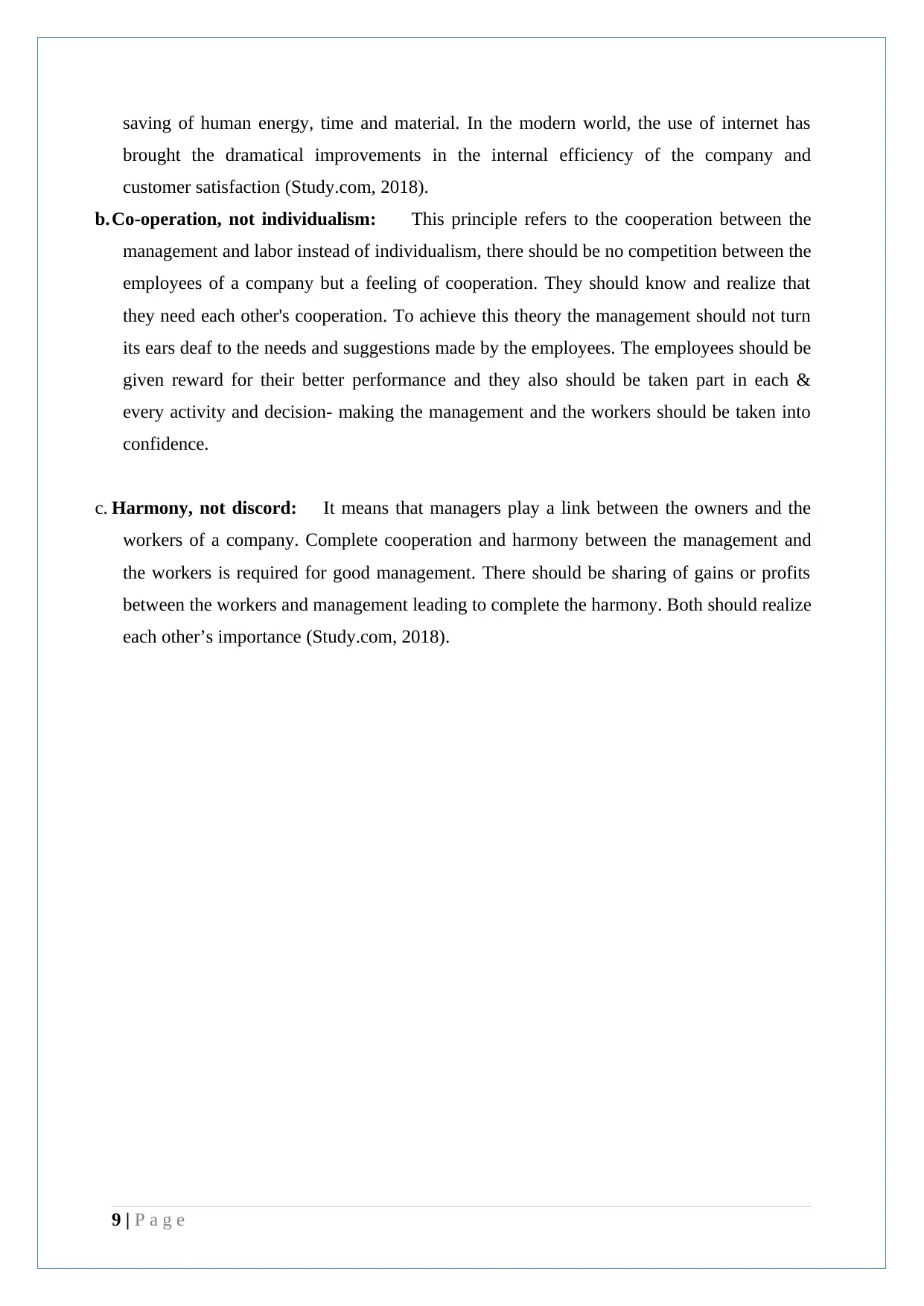
saving of human energy, time and material. In the modern world, the use of internet has
brought the dramatical improvements in the internal efficiency of the company and
customer satisfaction (Study.com, 2018).
b.Co-operation, not individualism: This principle refers to the cooperation between the
management and labor instead of individualism, there should be no competition between the
employees of a company but a feeling of cooperation. They should know and realize that
they need each other's cooperation. To achieve this theory the management should not turn
its ears deaf to the needs and suggestions made by the employees. The employees should be
given reward for their better performance and they also should be taken part in each &
every activity and decision- making the management and the workers should be taken into
confidence.
c. Harmony, not discord: It means that managers play a link between the owners and the
workers of a company. Complete cooperation and harmony between the management and
the workers is required for good management. There should be sharing of gains or profits
between the workers and management leading to complete the harmony. Both should realize
each other’s importance (Study.com, 2018).
9 | P a g e
brought the dramatical improvements in the internal efficiency of the company and
customer satisfaction (Study.com, 2018).
b.Co-operation, not individualism: This principle refers to the cooperation between the
management and labor instead of individualism, there should be no competition between the
employees of a company but a feeling of cooperation. They should know and realize that
they need each other's cooperation. To achieve this theory the management should not turn
its ears deaf to the needs and suggestions made by the employees. The employees should be
given reward for their better performance and they also should be taken part in each &
every activity and decision- making the management and the workers should be taken into
confidence.
c. Harmony, not discord: It means that managers play a link between the owners and the
workers of a company. Complete cooperation and harmony between the management and
the workers is required for good management. There should be sharing of gains or profits
between the workers and management leading to complete the harmony. Both should realize
each other’s importance (Study.com, 2018).
9 | P a g e
⊘ This is a preview!⊘
Do you want full access?
Subscribe today to unlock all pages.

Trusted by 1+ million students worldwide
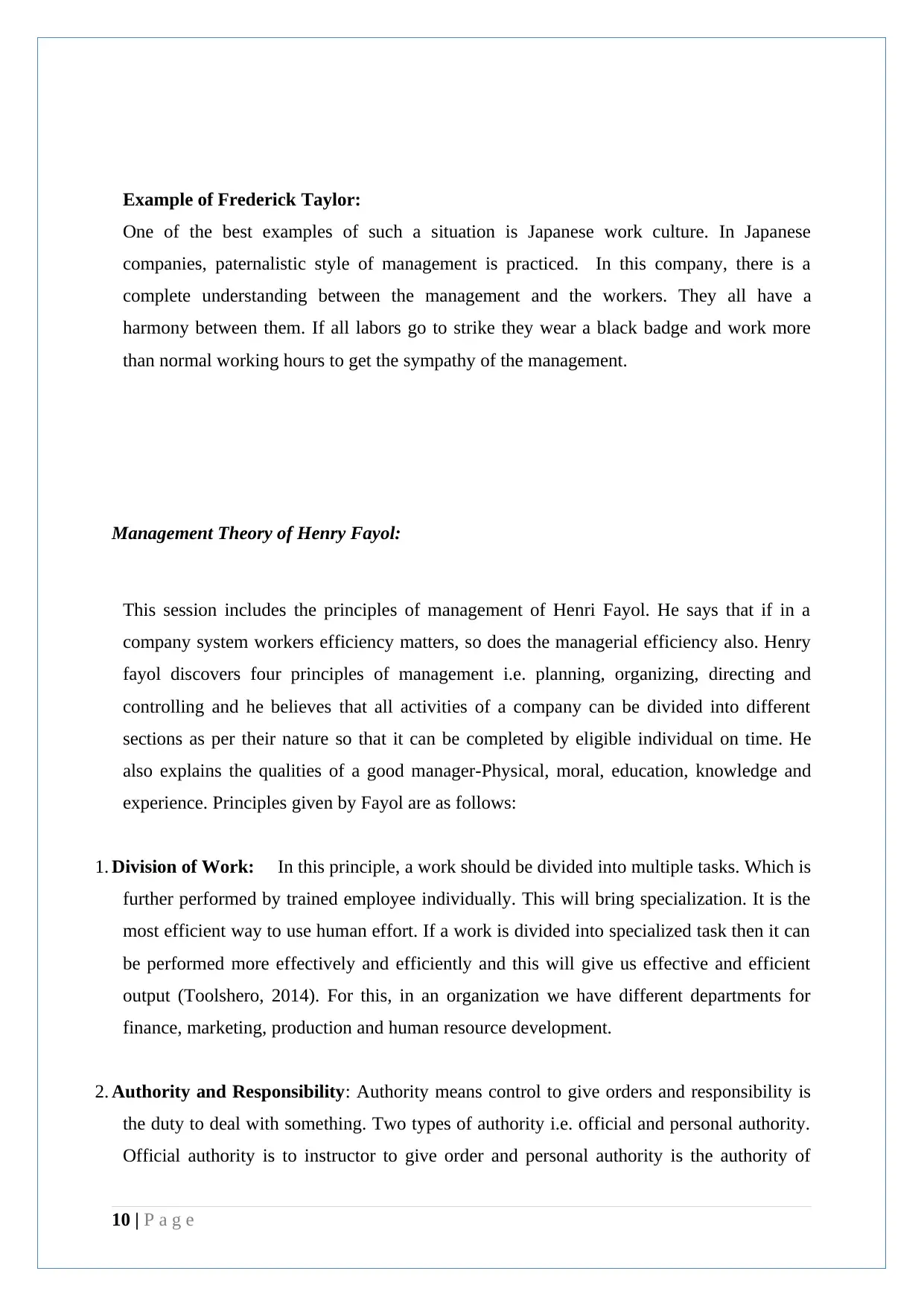
Example of Frederick Taylor:
One of the best examples of such a situation is Japanese work culture. In Japanese
companies, paternalistic style of management is practiced. In this company, there is a
complete understanding between the management and the workers. They all have a
harmony between them. If all labors go to strike they wear a black badge and work more
than normal working hours to get the sympathy of the management.
Management Theory of Henry Fayol:
This session includes the principles of management of Henri Fayol. He says that if in a
company system workers efficiency matters, so does the managerial efficiency also. Henry
fayol discovers four principles of management i.e. planning, organizing, directing and
controlling and he believes that all activities of a company can be divided into different
sections as per their nature so that it can be completed by eligible individual on time. He
also explains the qualities of a good manager-Physical, moral, education, knowledge and
experience. Principles given by Fayol are as follows:
1. Division of Work: In this principle, a work should be divided into multiple tasks. Which is
further performed by trained employee individually. This will bring specialization. It is the
most efficient way to use human effort. If a work is divided into specialized task then it can
be performed more effectively and efficiently and this will give us effective and efficient
output (Toolshero, 2014). For this, in an organization we have different departments for
finance, marketing, production and human resource development.
2. Authority and Responsibility: Authority means control to give orders and responsibility is
the duty to deal with something. Two types of authority i.e. official and personal authority.
Official authority is to instructor to give order and personal authority is the authority of
10 | P a g e
One of the best examples of such a situation is Japanese work culture. In Japanese
companies, paternalistic style of management is practiced. In this company, there is a
complete understanding between the management and the workers. They all have a
harmony between them. If all labors go to strike they wear a black badge and work more
than normal working hours to get the sympathy of the management.
Management Theory of Henry Fayol:
This session includes the principles of management of Henri Fayol. He says that if in a
company system workers efficiency matters, so does the managerial efficiency also. Henry
fayol discovers four principles of management i.e. planning, organizing, directing and
controlling and he believes that all activities of a company can be divided into different
sections as per their nature so that it can be completed by eligible individual on time. He
also explains the qualities of a good manager-Physical, moral, education, knowledge and
experience. Principles given by Fayol are as follows:
1. Division of Work: In this principle, a work should be divided into multiple tasks. Which is
further performed by trained employee individually. This will bring specialization. It is the
most efficient way to use human effort. If a work is divided into specialized task then it can
be performed more effectively and efficiently and this will give us effective and efficient
output (Toolshero, 2014). For this, in an organization we have different departments for
finance, marketing, production and human resource development.
2. Authority and Responsibility: Authority means control to give orders and responsibility is
the duty to deal with something. Two types of authority i.e. official and personal authority.
Official authority is to instructor to give order and personal authority is the authority of
10 | P a g e
Paraphrase This Document
Need a fresh take? Get an instant paraphrase of this document with our AI Paraphraser
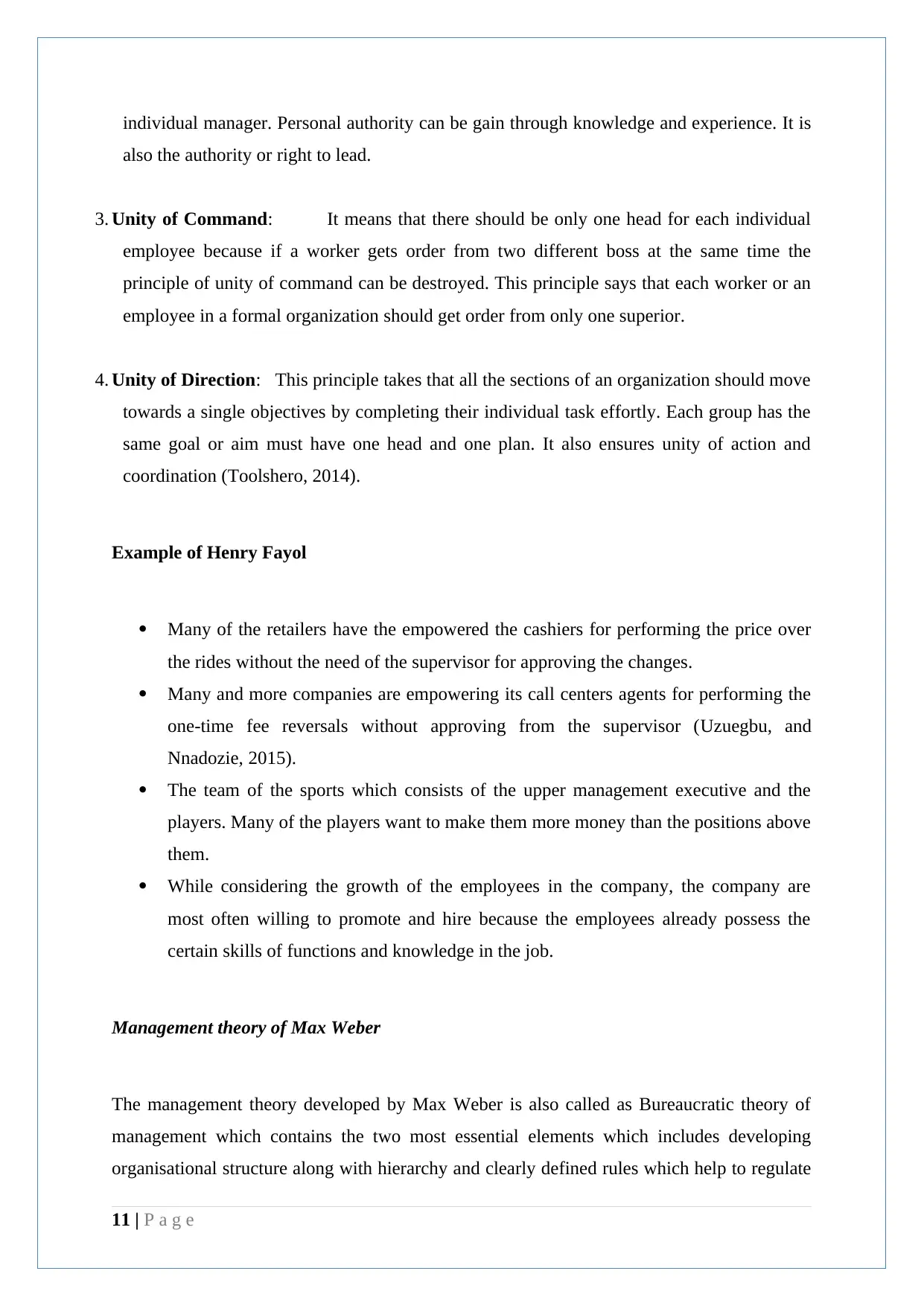
individual manager. Personal authority can be gain through knowledge and experience. It is
also the authority or right to lead.
3. Unity of Command: It means that there should be only one head for each individual
employee because if a worker gets order from two different boss at the same time the
principle of unity of command can be destroyed. This principle says that each worker or an
employee in a formal organization should get order from only one superior.
4. Unity of Direction: This principle takes that all the sections of an organization should move
towards a single objectives by completing their individual task effortly. Each group has the
same goal or aim must have one head and one plan. It also ensures unity of action and
coordination (Toolshero, 2014).
Example of Henry Fayol
Many of the retailers have the empowered the cashiers for performing the price over
the rides without the need of the supervisor for approving the changes.
Many and more companies are empowering its call centers agents for performing the
one-time fee reversals without approving from the supervisor (Uzuegbu, and
Nnadozie, 2015).
The team of the sports which consists of the upper management executive and the
players. Many of the players want to make them more money than the positions above
them.
While considering the growth of the employees in the company, the company are
most often willing to promote and hire because the employees already possess the
certain skills of functions and knowledge in the job.
Management theory of Max Weber
The management theory developed by Max Weber is also called as Bureaucratic theory of
management which contains the two most essential elements which includes developing
organisational structure along with hierarchy and clearly defined rules which help to regulate
11 | P a g e
also the authority or right to lead.
3. Unity of Command: It means that there should be only one head for each individual
employee because if a worker gets order from two different boss at the same time the
principle of unity of command can be destroyed. This principle says that each worker or an
employee in a formal organization should get order from only one superior.
4. Unity of Direction: This principle takes that all the sections of an organization should move
towards a single objectives by completing their individual task effortly. Each group has the
same goal or aim must have one head and one plan. It also ensures unity of action and
coordination (Toolshero, 2014).
Example of Henry Fayol
Many of the retailers have the empowered the cashiers for performing the price over
the rides without the need of the supervisor for approving the changes.
Many and more companies are empowering its call centers agents for performing the
one-time fee reversals without approving from the supervisor (Uzuegbu, and
Nnadozie, 2015).
The team of the sports which consists of the upper management executive and the
players. Many of the players want to make them more money than the positions above
them.
While considering the growth of the employees in the company, the company are
most often willing to promote and hire because the employees already possess the
certain skills of functions and knowledge in the job.
Management theory of Max Weber
The management theory developed by Max Weber is also called as Bureaucratic theory of
management which contains the two most essential elements which includes developing
organisational structure along with hierarchy and clearly defined rules which help to regulate
11 | P a g e
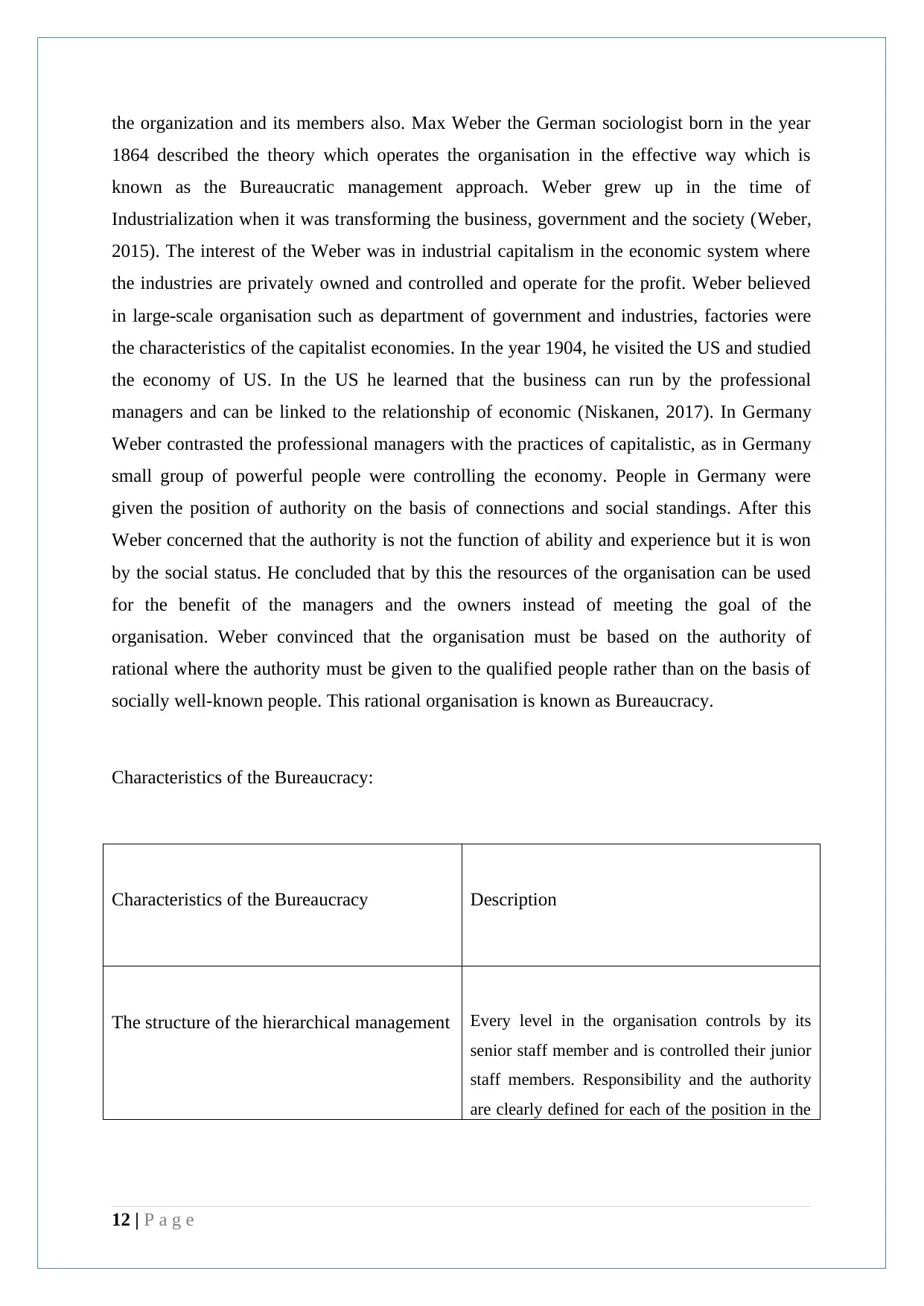
the organization and its members also. Max Weber the German sociologist born in the year
1864 described the theory which operates the organisation in the effective way which is
known as the Bureaucratic management approach. Weber grew up in the time of
Industrialization when it was transforming the business, government and the society (Weber,
2015). The interest of the Weber was in industrial capitalism in the economic system where
the industries are privately owned and controlled and operate for the profit. Weber believed
in large-scale organisation such as department of government and industries, factories were
the characteristics of the capitalist economies. In the year 1904, he visited the US and studied
the economy of US. In the US he learned that the business can run by the professional
managers and can be linked to the relationship of economic (Niskanen, 2017). In Germany
Weber contrasted the professional managers with the practices of capitalistic, as in Germany
small group of powerful people were controlling the economy. People in Germany were
given the position of authority on the basis of connections and social standings. After this
Weber concerned that the authority is not the function of ability and experience but it is won
by the social status. He concluded that by this the resources of the organisation can be used
for the benefit of the managers and the owners instead of meeting the goal of the
organisation. Weber convinced that the organisation must be based on the authority of
rational where the authority must be given to the qualified people rather than on the basis of
socially well-known people. This rational organisation is known as Bureaucracy.
Characteristics of the Bureaucracy:
Characteristics of the Bureaucracy Description
The structure of the hierarchical management Every level in the organisation controls by its
senior staff member and is controlled their junior
staff members. Responsibility and the authority
are clearly defined for each of the position in the
12 | P a g e
1864 described the theory which operates the organisation in the effective way which is
known as the Bureaucratic management approach. Weber grew up in the time of
Industrialization when it was transforming the business, government and the society (Weber,
2015). The interest of the Weber was in industrial capitalism in the economic system where
the industries are privately owned and controlled and operate for the profit. Weber believed
in large-scale organisation such as department of government and industries, factories were
the characteristics of the capitalist economies. In the year 1904, he visited the US and studied
the economy of US. In the US he learned that the business can run by the professional
managers and can be linked to the relationship of economic (Niskanen, 2017). In Germany
Weber contrasted the professional managers with the practices of capitalistic, as in Germany
small group of powerful people were controlling the economy. People in Germany were
given the position of authority on the basis of connections and social standings. After this
Weber concerned that the authority is not the function of ability and experience but it is won
by the social status. He concluded that by this the resources of the organisation can be used
for the benefit of the managers and the owners instead of meeting the goal of the
organisation. Weber convinced that the organisation must be based on the authority of
rational where the authority must be given to the qualified people rather than on the basis of
socially well-known people. This rational organisation is known as Bureaucracy.
Characteristics of the Bureaucracy:
Characteristics of the Bureaucracy Description
The structure of the hierarchical management Every level in the organisation controls by its
senior staff member and is controlled their junior
staff members. Responsibility and the authority
are clearly defined for each of the position in the
12 | P a g e
⊘ This is a preview!⊘
Do you want full access?
Subscribe today to unlock all pages.

Trusted by 1+ million students worldwide
1 out of 18
Related Documents
Your All-in-One AI-Powered Toolkit for Academic Success.
+13062052269
info@desklib.com
Available 24*7 on WhatsApp / Email
![[object Object]](/_next/static/media/star-bottom.7253800d.svg)
Unlock your academic potential
Copyright © 2020–2026 A2Z Services. All Rights Reserved. Developed and managed by ZUCOL.





